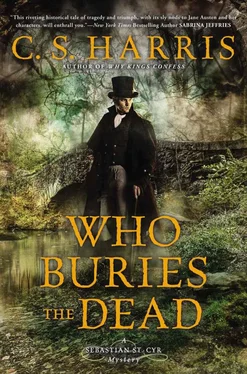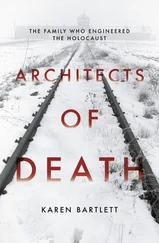C. Harris - Who Buries the Dead
Здесь есть возможность читать онлайн «C. Harris - Who Buries the Dead» весь текст электронной книги совершенно бесплатно (целиком полную версию без сокращений). В некоторых случаях можно слушать аудио, скачать через торрент в формате fb2 и присутствует краткое содержание. Год выпуска: 2015, Издательство: Penguin Publishing Group, Жанр: Исторический детектив, на английском языке. Описание произведения, (предисловие) а так же отзывы посетителей доступны на портале библиотеки ЛибКат.
- Название:Who Buries the Dead
- Автор:
- Издательство:Penguin Publishing Group
- Жанр:
- Год:2015
- ISBN:нет данных
- Рейтинг книги:4 / 5. Голосов: 1
-
Избранное:Добавить в избранное
- Отзывы:
-
Ваша оценка:
- 80
- 1
- 2
- 3
- 4
- 5
Who Buries the Dead: краткое содержание, описание и аннотация
Предлагаем к чтению аннотацию, описание, краткое содержание или предисловие (зависит от того, что написал сам автор книги «Who Buries the Dead»). Если вы не нашли необходимую информацию о книге — напишите в комментариях, мы постараемся отыскать её.
Who Buries the Dead — читать онлайн бесплатно полную книгу (весь текст) целиком
Ниже представлен текст книги, разбитый по страницам. Система сохранения места последней прочитанной страницы, позволяет с удобством читать онлайн бесплатно книгу «Who Buries the Dead», без необходимости каждый раз заново искать на чём Вы остановились. Поставьте закладку, и сможете в любой момент перейти на страницу, на которой закончили чтение.
Интервал:
Закладка:
Hero stared at Sebastian for a long, quiet moment, then went to lift the child from his basket and hold him in her arms, the blue wool skirts of her walking dress swirling about her ankles as she swung him gently from side to side and said, “Well, good afternoon, young man.”
Simon cooed and laughed in response, and for one long moment, Sebastian lost himself in looking at them.
Then he said, “Tell me about this character in Pride and Prejudice -I think his name is Wickham.”
She glanced over at him with a soft, startled laugh. “George Wickham? Whatever for?”
“Because everyone seems to keep referencing him, and I’ve just discovered Miss Jane Austen is the book’s author.”
“You can’t be serious. Who told you that?”
“Captain Wyeth. Ordinarily, I’d be inclined to question his reliability, but it makes sense of something Henry Austen said to me the other day.”
Hero brought Simon up so she could rub noses with him, her gaze on the laughing child. “George Wickham is an officer in the militia who is stationed near the Bennetts-they’re the family at the center of the story. At first he’s portrayed as handsome and charming and excellent in every way-except of course for his sad lack of fortune. But the reader gradually begins to realize that he is in truth a cunning and unscrupulous liar who uses others for his own ends without conscience or regret.” Simon gurgled happily, and she shifted the child’s weight, his eyes big and wide and golden as he grinned at Sebastian over her shoulder. “You think Captain Wyeth could be another George Wickham?”
“I’m told Jane Austen fears he might be. So who is Willoughby?”
“I suppose you could call him the villain of Sense and Sensibility -or one of them, at any rate. Like Wickham, he is charming, handsome, and impoverished, as well as being deceptive and breathtakingly selfish. Although I don’t think Willoughby is quite as conscienceless or calculating as Wickham. Needless to say, neither comparison reflects well on Captain Wyeth.”
“No. Which makes me wonder why he mentioned them.”
Wide-awake now, Simon reached out to close his tiny first around the thick silver chain at Hero’s neck and pulled hard.
“Ouch,” she said, laughing as she tried without success to loosen his hold on the necklace. “Your son has a shockingly strong grip.”
Sebastian set aside his wine. “Here; let me help.” It wasn’t until he came closer that he got his first good look at the intricately worked chain and the pendant that nestled at the base of her throat.
“Where did you get this?” he asked, his voice sounding odd even to his own ears.
“My father gave it to me some time ago. Why?”
Sebastian carefully loosed his son’s hold on the centuries-old necklace. “I’ve never seen you wear it.”
“The catch was faulty. I only recently had it mended.” The frown lines were back between her brows. “Is something wrong?”
“No. Of course not.” He reached out, hesitantly, to touch his fingertips to the smooth bluestone disk with a closed silver triskelion set against it. And for one heart-wrenching moment, he imagined he could feel the familiar pulse of its legendary, inexplicable power.
She said, “Have you spoken to Miss Jane Austen about any of this?”
“What? Oh; no.” He dropped his hand and turned away to retrieve his glass.
“Would you like me to talk to her? After all, I have read the books.”
“It might be better.”
She tilted her head to one side, as if both puzzled and concerned by something she saw. “Sebastian, are you all right?”
“Yes, of course,” he said, and drained the rest of his wine in one long, burning pull.
Chapter 36
Miss Jane Austen was in the elegant parterre garden at the rear of her brother’s house, deep in earnest consultation with an aged, gnarled gardener who was gesturing wildly with his hands, when Hero arrived at Sloane Street.
“I’m interrupting you,” said Hero when a flustered young housemaid showed her to the terrace. “I do beg your pardon.”
“No, please,” said Miss Austen, hurrying forward to offer Hero a seat at a wrought-iron table positioned to catch the warmth of the rare spring sunshine. She wore a faded bonnet and a plain, old-fashioned gown, had a faint smudge of dirt across one red cheek, and was utterly unruffled. “Jenkins simply wanted my approval of some new plantings for the parterres. The garden is my cousin Eliza’s design, you know. She spent many happy years in France, before the Revolution, and I think it reminds her of those days.”
“It is lovely,” said Hero, unfurling her parasol against the sun’s rays. “How does your cousin?”
“Not well, I fear.” Jane Austen’s dark eyes pinched with a deep, quiet sorrow kept carefully tucked away.
“I’m sorry.”
Her hostess nodded, her face held tight against a threatened upsurge of emotions. “She’s lived a marvelously adventurous life, you know-born in India, then living through the Revolution. She’s always been so vibrant, so full of life. To see her like this is. . painful.”
“It must be very difficult for your brother.”
“It is, yes. He has loved her almost his entire life.” She carefully smoothed the skirt of her faded gown. “Please tell me you aren’t here because Lord Devlin still thinks Henry had something to do with Stanley Preston’s death.”
The truth was, Devlin hadn’t ruled out anyone at this stage. But Hero simply adjusted the tilt of her parasol and said, “Actually, Devlin is interested in certain aspects of your novels.”
“My. .” Miss Austen’s naturally ruddy cheeks darkened ever so slightly. “Who told you? My brother?”
“Indirectly-along with Captain Wyeth.”
“Ah.” She paused while the young housemaid reappeared bearing a hastily assembled tea tray, the delicate, rose-strewn china cups and plates clattering as the girl dumped the tray on the table. “Throughout history, we women have been endlessly scorned for our supposed readiness to reveal things which ought by rights to remain private. Yet I find that, in practice, men are equally-if not more-inclined to indiscretion.”
Hero laughed. “I suspect you are right. Although the truth is, your novels have excited so much interest in fashionable circles that I doubt you’ll be able to remain anonymous much longer.”
It was a thought that did not appear to trouble the author overly much, and Hero suspected the choice to publish anonymously had been prompted less by a desire to remain unknown than by the realization that society would condemn any spinster vicar’s daughter who appeared to be chasing fame and recognition.
Miss Austen eased the cover from the teapot and began to pour. “Surely Lord Devlin can’t think my novels have anything to do with this murder.”
“No, of course not. But your brother says you think Captain Wyeth might be another Wickham or Willoughby, and I assume it isn’t simply because the three men’s names all begin with the same consonant.”
Miss Austen kept her attention on the task of pouring the tea. “It would be more accurate to say I worry that he might be. Have you met him?”
“No.”
“He comes across as an agreeable, sensible man with good understanding and a warm heart. A man of strength and principle.”
“But?” prompted Hero.
Miss Austen looked up from the tea. “Who can answer for the true sentiments of a clever man?”
“Is he clever?”
“Very.”
Hero took the teacup handed her. “Has he given you reason to suspect his sincerity?”
“Truthfully? No.” Miss Austen took a sip of her own tea and stared out over the sun-warmed, French-style garden. “Eliza-my cousin-believes that Anne’s love has proven itself so enduring that she ought to be allowed to marry her captain, although of course she worries what sort of future lies ahead for them. We’ve all known young women who married poor men for love, only to live a life of regret. Poverty can be so terribly grinding.”
Читать дальшеИнтервал:
Закладка:
Похожие книги на «Who Buries the Dead»
Представляем Вашему вниманию похожие книги на «Who Buries the Dead» списком для выбора. Мы отобрали схожую по названию и смыслу литературу в надежде предоставить читателям больше вариантов отыскать новые, интересные, ещё непрочитанные произведения.
Обсуждение, отзывы о книге «Who Buries the Dead» и просто собственные мнения читателей. Оставьте ваши комментарии, напишите, что Вы думаете о произведении, его смысле или главных героях. Укажите что конкретно понравилось, а что нет, и почему Вы так считаете.












